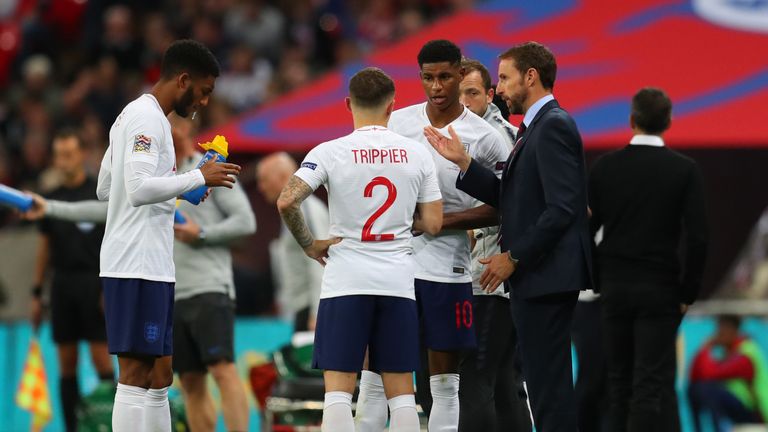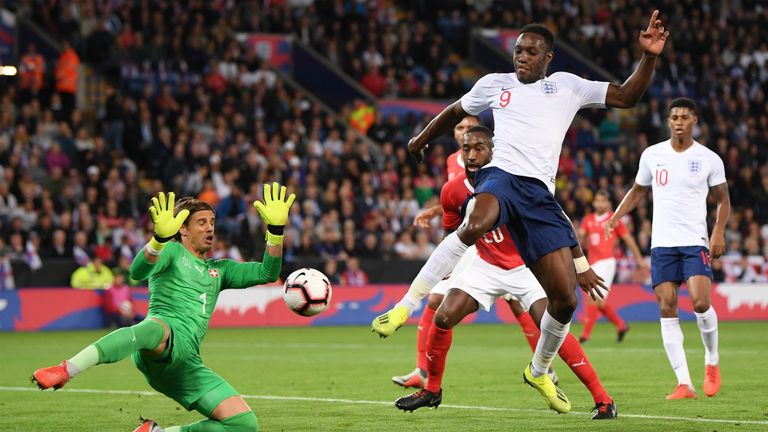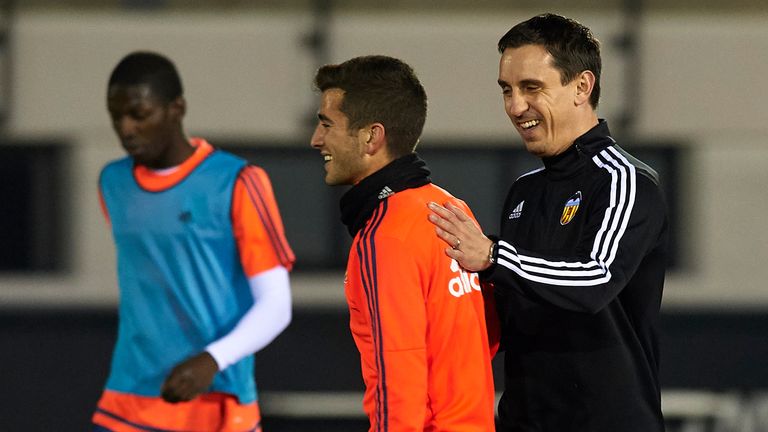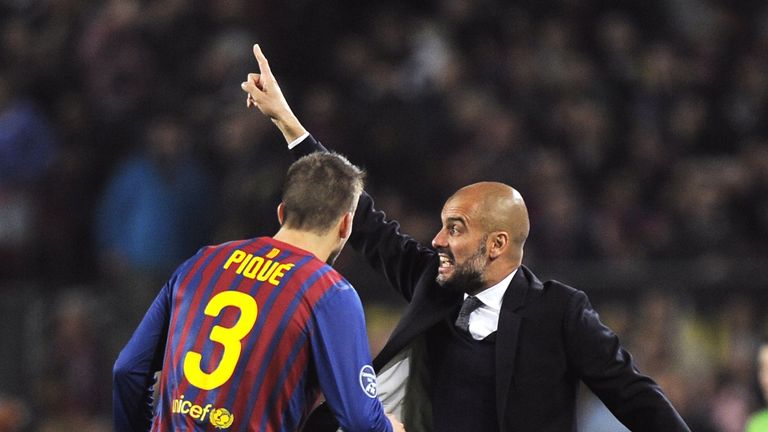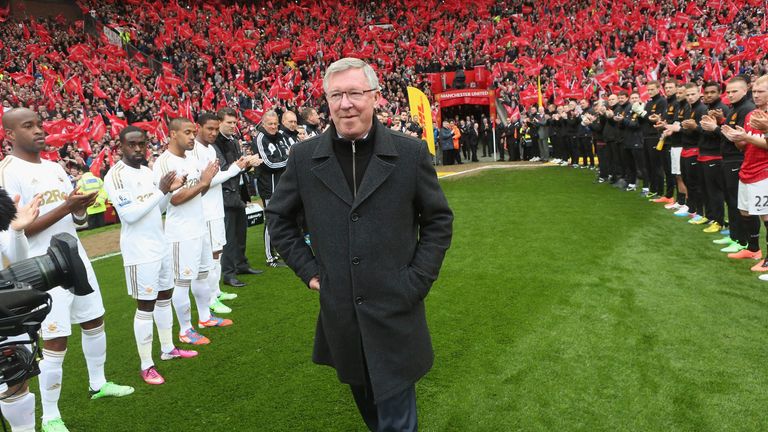Gary Neville on playing out from the back
Debate around goalkeeper and defender roles in modern football still rages
Thursday 13 September 2018 13:55, UK
Gary Neville gives in an intriguing and in-depth view on goalkeepers and defenders playing out from the back, and why courage and trust is vital.
Speaking on the Gary Neville Podcast, the former Manchester United and England defender had strong views on the tactic, from both a playing and coaching point of view.
Here, he looks back on over 20 years with England, his experiences in Spain with Valencia, and how Sir Alex Ferguson's advice is still vital today.
Jamie Carragher said something at half-time during England's 1-0 win over Switzerland, which I thought rang true. England aren't the first team to be asked to play out of the back.
Gareth Southgate said something after the loss against Spain on Saturday that probably needs more context; he said we don't want to go back to how we used to play.
Neville's England analysis
More Gary Neville
I have to say, I played for England and was a coach for England for 20 years and was never asked by a manager to play the ball long, whether it be under Terry Venables, Glenn Hoddle, Sven-Goran Eriksson and then obviously with Roy Hodgson. We always tried to play out from the back, so this is not new.
My view is that when you go to three at the back, there is a feeling you will play out from the back more. What's normally wrong when a team gets dispossessed is that the execution, positioning and decision-making is wrong. It was a casual, sloppy approach that cost England in the first half against Switzerland, and that approach will cost you whether you are playing out from the back or playing through central midfield.
For me, we get a little bit too obsessed with saying: "Oh we have to play out from the back! We have to do this, we have to do that!" The reality of it is, in my 20 years with England we were never asked to lump it long.
I was always asked to split as a full-back, and the same if I was a right centre-back in a back three, I was always asked to just get on the ball. If the option wasn't there to get on the ball, then you play it forward. But that's not different to what we're seeing now.
You may say: "Let's take a few more risks." But I played at Manchester United, they played possession football for 25 years, playing out from the back, where centre-backs try to play.
Yes, there is maybe more of an emphasis on it now because of Barcelona's success.
But the goalkeeper should always be the last option.
For me, as a right-back, my first option was the striker.
My second option was the second striker.
My third option was the winger.
My fourth option was my central midfield player.
My fifth option was my right centre-back.
My sixth and final option was my goalkeeper.
That was it. I was programmed as a right-back to play that way.
Goalkeeper-wise, I had an experience from Spain, and this doesn't relate to goalkeepers everywhere so I don't want English goalkeeping coaches ringing me up or English goalkeepers doing the same.
In training sessions in England, the goalkeeping coach will always take the goalkeepers out half an hour before the team. They'd do their warm-ups, kicking work, reaction work. They'd continue to stay with the goalkeeping coach, and then would join the rest for the training match when the players needed them.
I went over to Spain, and I remember in my very first session I got out onto the training pitch, and the goalkeepers weren't out. I turned around to Phil and said: "Where are the goalkeepers?" He said: "They come out at exactly the same time as the players."
I'm thinking: "Well that's not right." He said: "Well you're not going to change it over here. That's how it works."
I remember speaking to Ocho [Jose Manuel Ochotorena], the Valencia goalkeeper coach, and he told me the goalkeepers would come out at the exact same time as the players. They will then take part in the small possession games, the 8v2s. When I played, we didn't want the goalkeepers in those, because they'd mess it up! In Spain, they'd partake and get their feet moving. They'd then go into a possession practice, maybe a 4v4 with two spare, and the two spare would be the goalkeepers on the edge of the pitch, serving in. They would get used to serving the ball in, one or two touch, under pressure.
You'd then go into your small-sided game or practice match and they would continue. At the end of the session when the footballing work was done, they'd then go to do their goalkeeping work at the end of the session, when they were more tired. It was a complete transformation and change in the way I saw goalkeeper training.
At the end I thought there was no wonder that the Spanish goalkeepers are better with their feet. They have an hour extra every single day playing with their feet. That's why you then see English goalkeepers over the last five, 10, 15 years who are not as good with their feet as their Spanish counterparts.
I'm not saying it was happening at every club, but it was definitely the Spanish culture when I was there. The goalkeeper should always be involved in the football training, and the goalkeeper training should come at the end.
We saw Jack Butland playing out of the back on Tuesday; he's got to get better at it. He's got to get more comfortable. They've got to be able to use him. Southgate said after Saturday that they won't change, and they shouldn't change. My view is that England have not gone direct and long since Graham Taylor, and we should maintain that.
You should always try to play into your midfield, or the striker's feet, or pockets. Every coach in the land will say: "Always play your most forward option." That's just obvious. Whether that's Barcelona or any team.
I remember Sir Alex would go absolutely crazy if he thought I'd refused a pass forward into my right-sided midfielder or central midfielder or striker's feet. He didn't want me to lump it down the channel, he wanted me to play it into feet to get the ball moving.
I remember, particularly at Old Trafford in the first half on my right side where the dugouts are, you could hear him screaming if you turned away from a pass and went back to your goalkeeper.
Pep's influence
The 2009 Champions League final - it's a big statement - but it changed football in terms of how we think of it.
I remember sitting in the stands in Rome for Barcelona v Manchester United, and seeing Gerard Pique and Yaya Toure three yards from the touchline, Victor Valdes in goal, Sergio Busquets going to the edge of the box, and us putting on a high press. On two or three occasions we dispossessed them high up the pitch, and could have scored. We didn't.
I remember Barcelona continuing to do it, and I was thinking: "We're going to do them here, we're going to win the ball back and score."
Pep had come in, his first season at Barcelona, and I remember seeing the centre-backs so, so deep, and thinking: "This is madness."
After about 20 minutes the game changed. The United players' legs started to fade. You could feel it. The Barca players were continuing to move it from deep positions, picking us off and moving the ball through midfield. I remember thinking: "That's different."
The year after people really started to get used to the Guardiola way of playing. Javier Mascherano went to centre-back, Pique went even deeper, and it then became the beginning of this great side, where Lionel Messi went from being a right winger to a false nine. We saw possession, and a team, and its greatest level. One of the big foundations of that was playing out from the back, and that transformed our thinking forever.
What we've seen since is centre-backs park their backsides on that touchline trying to play out.
Fergie's advice
People think about courage on a football pitch, and I always refer back to my United experiences, being taught by Sir Alex, the pinnacle in terms of management.
He didn't measure courage by a tackle or running. He would say: "When the game is at its highest pressure, when the crowd is on top of you, I want players who have the courage to take the ball."
He would say: "Trust them. Trust Scholes, trust Keane, trust Carrick, trust Robson, whoever."
In English football over the years is that in the real pressured situations, where you might be 1-0 up with 10 minutes to go, do you still continue to trust your team-mates? To play with courage? Do your midfield players still show? Or do they start to say: "Play it forward." Those are the big moments.
So when you're teaching kids, you'd say to them: "Irrespective of losing, winning, pressure in a game, you must have the courage to take the ball."
I can hear Sir Alex saying it now, he would say it nearly every game. "Have the courage to take the ball!" If you think about the atmospheres Manchester United had to deal with away from home over the years, all the teams wanting to beat us. He would still say: "Take the ball!"
So for me, a principle for a young kid from a coaching point of view wouldn't solely be going to play on the touchline and playing out from the back, it would be having the courage to show for the ball, getting on the right angle, on the half turn, trust in your team mate, give it to him and go. And then show for it again.

